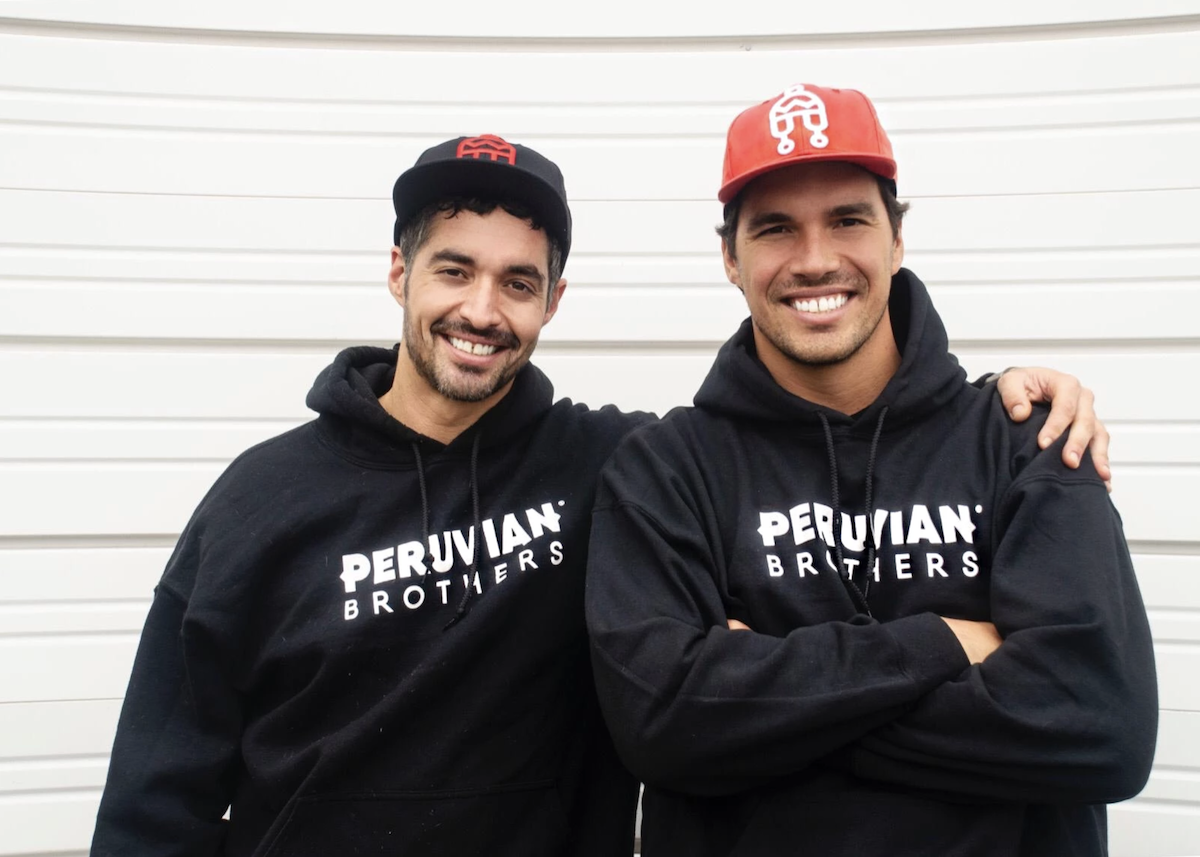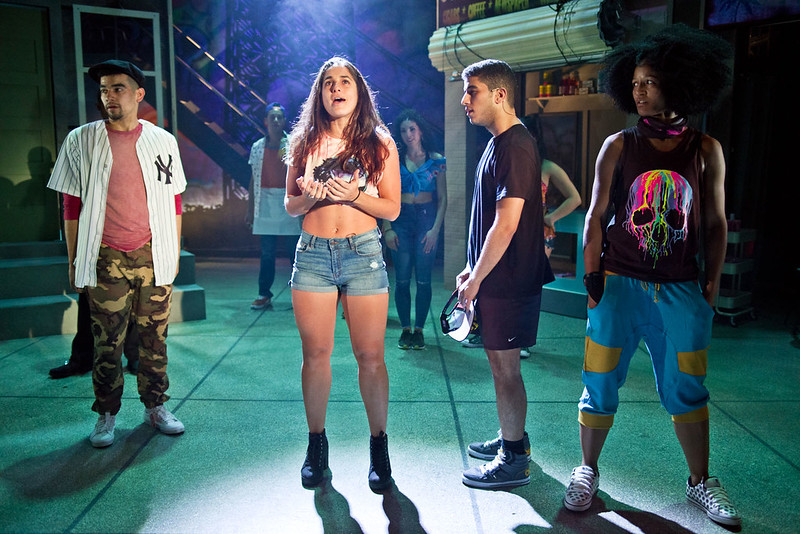

Giuseppe and Mario Lanzone, co-founders of Peruvian Brothers. (Courtesy of Peruvian Brothers)
WASHINGTON, D.C. — Giuseppe and Mario Lanzone have been running their food business, Peruvian Brothers, for seven years in the D.C. area. The real-life brothers serve up empanadas, Peruvian-style rotisserie chicken, freshly made chicha morada and more of their favorite foods from their childhood in Lima.
They have gone from being a food-truck and catering operation to having two newly-opened stationary locations, one in a new Latino-themed market in the city, and an outdoor stand in nearby Crystal City.
All this growth is a challenge to maintain, as it has come at the start of one of the most severe economic downturns in U.S. history. Businesses across the country are struggling as people avoid going outside during the coronavirus pandemic, and Latino-owned businesses are no exception.
A new report shows that the coronavirus pandemic has had a major negative effect on Latino-owned and Latino-serving businesses in the Washington, D.C. region.
More than half of the over 150 businesses polled said they were experiencing “severe upheaval” to their business between April and June of this year, with 30 percent reporting they had to close their business completely, either permanently or for the time being.
Three-quarters of respondents said they had experienced “catastrophic loss of revenue and customers.” They found that in part this was because Latino small business owners didn’t have strong relationships with banks, and in previous research found they take out loans at lower rates than non-Latino business owners.
“The effects of the pandemic as an economic crisis has been tremendous for [Latino] business owners,” said Robert Albro, associate professor at American University’s Center for Latin American and Latino Studies (CLLS).
The study came from a long-standing partnership between CLLS, American University’s Kogod School of Business and the Greater Washington Hispanic Chamber of Commerce.
“The uncertainty around all of that [pandemic] has really been debilitating for people trying to decide how long will this closure last, and how dramatic are the changes I need to make to my business to survive, if I’m going to do it,” Albro said.
This is all happening as Latinos, along with African-Americans, are the group with the highest rate of coronavirus deaths in D.C. Traditionally Latino neighborhoods like Mount Pleasant and Columbia Heights have among the highest numbers of confirmed cases of the virus in the district.
Latinos are essential to the U.S. economy, both as consumers and entrepreneurs. They are the group most likely to open new businesses in the D.C. region. Eighty percent of Latino business owners in the area are immigrants, and overall they make up more than a tenth of businesses here.
The D.C. region’s Latino population is mostly made up of Central and South American immigrants and their families, and it’s the only major metropolitan area where Salvadorans are the largest Latino group.
Yet outside of census data, not much is known about Latino-owned businesses in the area, according to Nicole Quiroga, president of the Greater Washington Hispanic Chamber of Commerce (GWHCC).
Part of what her organization does is assist Latino business owners by providing guidance and information. At the beginning of the pandemic and the shutdown, Quiroga saw just how deep the need for information among Latino business owners was.
“We basically became like a hotline,” Quiroga said about the days at the start of the pandemic. “We’d field calls and they’d tell us what their questions were, and we’d field them where to go next.”
In Columbia Heights, the historic GALA Hispanic Theatre was hit hard by the pandemic. “We had to close half of our season, so we lost about $200,000 in ticket income that was projected to be brought in towards the end of the year, plus about $100,00 on our fundraising event that had to be canceled, to say nothing of having to regroup,” said co-founder and executive director Rebecca Medrano.


Photo from a production of In The Heights at GALA Hispanic Theatre in Washington, D.C. (Courtesy of GALA)
“We don’t really have the technology for all the streaming and virtual stuff, although we’ve made that switch. We adapted in terms of the programs for youth. For example, we’re doing half of it virtually, and this summer we’ve been able to bring half of them back for some on-site learning,” Medrano said.
The theater has taken on a PPP loan so none of their nine full-time staff had to be laid off, but Medrano fears for the future if the theater is unable to partially re-open as planned in September.
“We feel it’s important and our commitment to the Latino community to at least open in the end of September at least for a while to see how we do. I know all theaters are suffering, but we’re the only Latino theater that’s doing this work, and if we’re not telling these stories, who is? If we’re not employing Latino artists, who is?”
For the Lanzone brothers, they knew that pivoting was going to be key for surviving the pandemic.
“For the first two, three months, my brother and I were pulling seven days a week, 12, 14 hours a day,” Giuseppe Lanzone, co-founder and COO of Peruvian Brothers said. “My step count was really high during those times,” he remembered.
View this post on Instagram
They fundraised to donate meals to first responders, partnered with non-profits like World Central Kitchen to donate food to essential workers, and Lanzone said their outdoor stand, which opened in April, could not have come at a better time. “It’s great because it’s in the middle of a park, it’s perfect not to be indoors,” he said.
They have managed to keep both their full-time staff of about 15 people employed, as well as about 15 part-time workers.
Yet they have come across roadblocks with importing some of their products from Peru, where coronavirus cases are increasing. Their rocoto hot sauce requires a pepper they usually fly in from Peru, and they also purchase small chullos hats for the sauce bottles, made by women artisans in Juliaca.
For now, Lanzone said they are using their pepper and chullo reserves until they can figure out how to import more.
“We’ve had to change a lot of things,” Lanzone said. “A lot of people ask me, ‘hey, how are you still afloat?’ I believe if you’re doing the same things you were doing pre-COVID, it’s not going to work. You have to be a really good swimmer. Because we’ve been swimming against the current for a while.”
***
Ana Lucía Murillo is a journalist based in Washington, D.C. and the 2020 summer correspondent for Latino Rebels. She tweets from @analuciamur.


